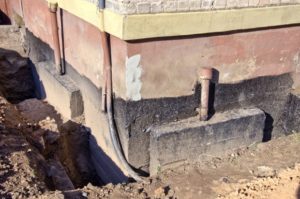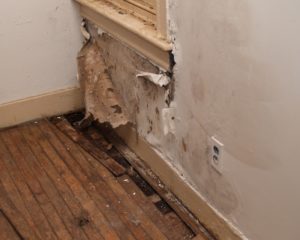Groundwater Effects on Foundations
It’s easy for homeowners to assume that the foundation of their house is indestructible. How could it be otherwise? A foundation is usually a thick slab of poured cement, reinforced with steel rods, so it seems like something that would be pretty difficult to damage. It can be especially hard to believe that water could have any impact on such a sturdy component of the home, but in fact, water can harm a foundation in several ways. If you’re not paying attention, water can cause extensive damage to the foundation, necessitating costly repairs, and can even make its way into the house.
How does this happen? It often has to do with groundwater. Groundwater is an important natural resource, making up about 98 percent of usable water on Earth. It comes from precipitation in the form of rain, snow, sleet, and hail soaking into the ground, and it fills the spaces between soil, sand, gravel, and rocks. Gravity pulls groundwater down until it reaches a level that’s fully saturated, and the top of the saturated water level is called the water table. Groundwater levels must be considered when building on a piece of land.
That’s because a high water table can be a big issue when you’re putting in a foundation. If you excavate to the level of the water table, the bottom of the hole you intended for the foundation can quickly fill with water. This is a problem because it destabilizes the sides of the hole, which can result in cave-ins that damage form work and drainage systems. Further, if mud ends up in your concrete because there was water in the hole, it can weaken the footings on which your entire house rests. Footings poured on top of wet soil that has expanded can settle once the water is gone, leading to future foundation problems.

Once a house is built, water can cause trouble with the foundation in a few different ways.
- Groundwater can push against the foundation. The groundwater around your house ebbs and flows, just like the ocean. If you think about the way pressure intensifies the further you go down into the ocean, it’s easy to picture how the groundwater can apply pressure to the bottom of your house. This force of rising groundwater is called hydrostatic pressure, and it’s powerful and unremitting. It’s unlikely that it would lift your foundation, but it does seep into the basement through cracks and widening joints, and it can even permeate solid concrete over time. To keep groundwater from damaging the foundation, you can use preventive measures like a sump pump in the basement floor and a tile drainage system. It’s important to stop groundwater from infiltrating the foundation, because if a leak begins, it will grow until it’s repaired, wreaking havoc on your home.
- Dense soil that drains inefficiently absorbs water. This means that whenever it rains, the ground around the house swells, and this can place an immense amount of pressure on the foundation walls. Over time, this pressure can create gaps and cracks in the foundation, allowing water to seep into the basement. If this goes on long enough, the foundation can disintegrate to the point that the walls tip or rotate inward. When that happens, major foundation rehab work will be necessary.
- Water that pools on the surface of the ground around the house can degrade concrete and mortar foundations. This often happens because of landscaping that’s graded incorrectly and slopes toward the house instead of away. When it rains, the water collects around the house and makes its way down to the foundation. This can also happen when rain gutters are clogged and water is flowing from them onto the ground, or when downspouts are too short and send water back toward the house.
Once water is in the basement, it can cause several different problems. Humidity can cause things in the basement to oxidize and rust, and any moisture in a basement can create a welcoming environment for bacteria and mold. This can damage your belongings and compromise the structural integrity of your home. A foundation weakened by cracks and a wooden frame damaged by mold can lead to major issues for your entire home, and that can lead to costly repairs.

How do you keep it from reaching a critical point? Take care of minor cracks, before they become bigger problems. Small cracks pose a problem because they let in moisture, pests, and mold. Large cracks, on the other hand, can put stress on the structure of your home, causing severe damage to the frame. Even if you can’t see the cracks, there are some signs to look out for, that may indicate that your foundation needs repair. These include:
- Cracks larger than 1/16th inch in the walls, floors, structural columns, or window and door openings.
- Your home sinking into the soil on one side.
- Cabinets and counters that are coming away from the wall.
- Windows and doors that stick.
- Basement walls that bow inward.
- Water in the crawl space or basement.
- Termites or other pests.
Fortunately, a professional foundation repair company can repair most foundation issues. It’s not a simple job, but it’s crucial to protect your home’s stability. If you notice signs of a damaged foundation, take action as soon as possible. Write down details about what you’re seeing, including the size, length, and location of any cracks, and call in a professional to assess the damage and give you an estimate. Be aware that after the foundation is fixed, other repairs will probably be necessary throughout the house. Additionally, having the basement waterproofed to prevent further damage is a wise move.
When you need basement services or foundation repair, Budget Waterproofing can help. In addition to waterproofing, mold remediation, mold cleaning, and crawl space encapsulation, we provide foundation repair, going beyond patching cracks to find the source of the problem. At Budget Waterproofing, we’ve got more than 55 years of experience servicing both commercial and residential customers throughout Maryland. We’re proud of our craftsmanship and confident in our skills, and all of our technicians are fully licensed and insured. Whether you need foundation repair, basement waterproofing, a drainage system, crawl space waterproofing, or egress window installation, we’ve got you covered, with the experience and skills necessary to improve your basement and protect your family. For more information, contact us today.
